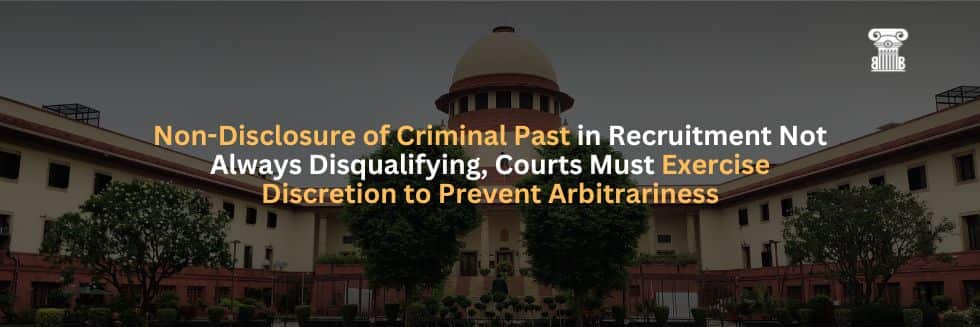In a significant decision, the Supreme Court emphasized that the failure to disclose a criminal history during recruitment does not always result in disqualification. The appellant’s selection as a Constable was revoked due to his omission to disclose a past criminal case during the verification process despite being subsequently acquitted. The Court stressed that while withholding material information is unacceptable, individuals have the right not to face arbitrary treatment. The Court deemed the cancellation order unfair and directed the appellant’s appointment as a Constable underscoring the importance of adhering to prescribed procedures in character verification forms.
CASE DETAILS:
Ravindra Kumar v. State of U.P. & Ors.
Civil Appeal No. 5902/2012
Supreme Court
Coram: Justices JK Maheshwari and KV Viswanathan
BRIEF FACTS:
- The appellant initially approached the Allahabad High Court after his selection as a Constable was revoked due to the non-disclosure of a criminal case against him during the verification process as per a letter dated April 12, 2005.
- According to the recruitment notification, the appellant was obligated to provide an affidavit in the format provided by the Selection Committee explicitly stating that failure to disclose relevant facts could result in the cancellation of selection. Despite being required to disclose all registered criminal cases and details of acquittals, the appellant answered the queries negatively.
- A Single Judge dismissed his plea, noting that the appellant had concealed material information regarding his involvement in a criminal case at the time of filling out the form and this concealment was not absolved by subsequent acquittal.
- In the Special Appeal against the Single Judge’s decision, a Division Bench of the High Court concurred asserting that if an individual swears a false affidavit during enrollment, they are unsuitable for disciplined service. While denying relief, the Division Bench also stated that the act of swearing a false affidavit reflects on a person’s conduct and character.
- Displeased with this decision, the appellant approached the Supreme Court contending that there was no deliberate concealment on his part and that the disclosure was not made under the belief that it was unnecessary in light of the acquittal.
OBSERVATIONS:
After hearing both parties, the Court noted that at the time of the appellant’s application for the post of Constable, no criminal case was registered against him. The involvement in the criminal case arose five days after his application. The appellant was eventually acquitted by the Trial Court, a decision that was not contested.
Referring to the case of Avtar Singh, the Court emphasized that while a person who withholds material information cannot claim an unfettered right to appointment, they have the right not to be treated arbitrarily. Any action taken should be based on objective criteria after considering all relevant aspects. The employer should also take into account any special circumstances of the case when deciding to cancel an appointment.
The Court outlined several crucial aspects to consider when adjudging suitability and determining the nature of relief, including the nature of the office, timing and nature of the criminal case, the judgment of acquittal, contents of the verification form, character verification reports, socio-economic background of the applicant and other antecedents. Referring to the case of Ram Kumar v. State of U.P. and Others where a similar case of cancellation of selection to the post of Constable was considered, the Court highlighted that despite allegations of furnishing incorrect information relief was granted in that case.
The Court observed that the verification report in the present case stated that the appellant’s character and general reputation were good with no complaints against him. Both the Station House Officer (SHO) and the Superintendent certified the appellant to be of good character. Based on the above considerations, the Court held that the cancellation order was neither fair nor reasonable as it did not follow the prescribed mandate in the character verification form. Instead of assessing the appellant’s suitability for appointment, the Appointing Authority mechanically concluded that the selection was irregular because of the alleged false affidavit.
JUDGEMENT:
The Court determined that non-disclosure in the present case could not be deemed fatal and directed the appellant to be appointed to the post of Constable for which he was selected. While arrears of salary for the period of non-service were denied, the appellant was entitled to all notional benefits including pay, seniority and other consequential benefits.






